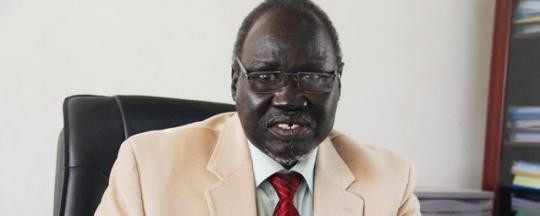The leader of the SPLM-DC party in the South Sudanese national parliament Onyoti Adigo Nyikwec says the Protocol on Transitional Arrangements proposed by peace mediators in Addis Ababa does not address the root causes of the crisis in South Sudan.
The Protocol on Principles on Transitional Arrangements was endorsed by leaders of the East African regional bloc IGAD. It was accepted by one of the warring parties, SPLM-Juba led by Salva Kiir, but rejected by the SPLM-IO faction led by Riek Machar.
The document addresses political issues and is not to be confused with the Implementation Matrix on Cessation of Hostilities, which addresses security issues and was signed separately by representatives of both SPLM-IO and SPLM-Juba.
Today the South Sudanese parliament held a special session to discuss the IGAD proposal. The session was first briefed by SPLM-Juba MP Nhial Deng Nhial, who spoke about the latest developments at the peace talks in Addis Ababa, which have been temporarily adjourned.
Nhial explained that the Protocol was signed by Salva Kiir but was rejected by SPLM-IO.
Onyoto, who is deputy chairman of SPLM-DC, voiced reservations about the Protocol, pointing out that the other stakeholders at the peace talks in Addis Ababa have not endorsed the document. The other stakeholders include the Political Parties delegation – headed by the SPLM-DC chairman – the civil society representatives, the church leaders, and the SPLM-Leaders group.
“Who owns this document? Because the first people to sign this document should be the ones who are negotiating. Unfortunately, IGAD became signatory to the document without the signature of the stakeholders,” Onyoti told the other MPs in attendance.
He stressed that neither the rebels (SPLM-IO) nor the other stakeholders endorsed the document, but only Salva Kiir and the heads of state of IGAD.
The opposition MP said he thinks he could offer some observations to contribute to finding a solution to the 9-month conflict.
In particular he took issue with paragraph 2, which states that that “Head of State and Government, Commander-in-Chief of the Armed Forces of the TGONU shall be the elected, incumbent President of the Republic; the President of the Republic shall be deputized by a Vice President of the Republic.”
Onyoti said this paragraph requires clarification. “It says the President of the Republic shall be deputized by a Vice President of the Republic (which has more power than the Prime Minister), so this one here needs to be defined for the sake of peace in this country.”
The sitting was chaired by Speaker Manasseh Magok, who supported the document saying that it will preserve President Salva Kiir as head of the coming transitional government.
He also pointed out that the holder of the position given to the opposition, Prime Minister, will not be eligible to stand for any public office in the national elections at the end of the transitional period.
Over the weekend the IGAD chief mediator clarified that provisions of the Protocol were still open to negotiation. He pointed out that the majority of its clauses were not disputed, but only a few key paragraphs were contested.
In particular, SPLM-IO are contesting paragraph 2, which maintains Salva Kiir in the presidency throughout the transitional period of 30 months. If this provision were included in a peace agreement, it would keep him in power for about two years longer than his elected term, depending on when the transitional period begins.
South Sudan’s constitution states in Article 100, “The tenure of the office of the President of the Republic of South Sudan shall be four years, commencing from July 9, 2011.” This means that under the current constitutional order the incumbent president will be constitutionally illegitimate after July 2015.
Related:
SPLM-Juba urges S. Sudan parliament to endorse transitional government (1 Sept.)
SPLM-Juba faction holds leadership meeting in Juba (28 Aug.)
Document: Agreed Principles: Transitional Government Arrangements (26 Aug.)
SPLM-DC says formation of transitional govt not Kiir’s decision (13 Aug.)




